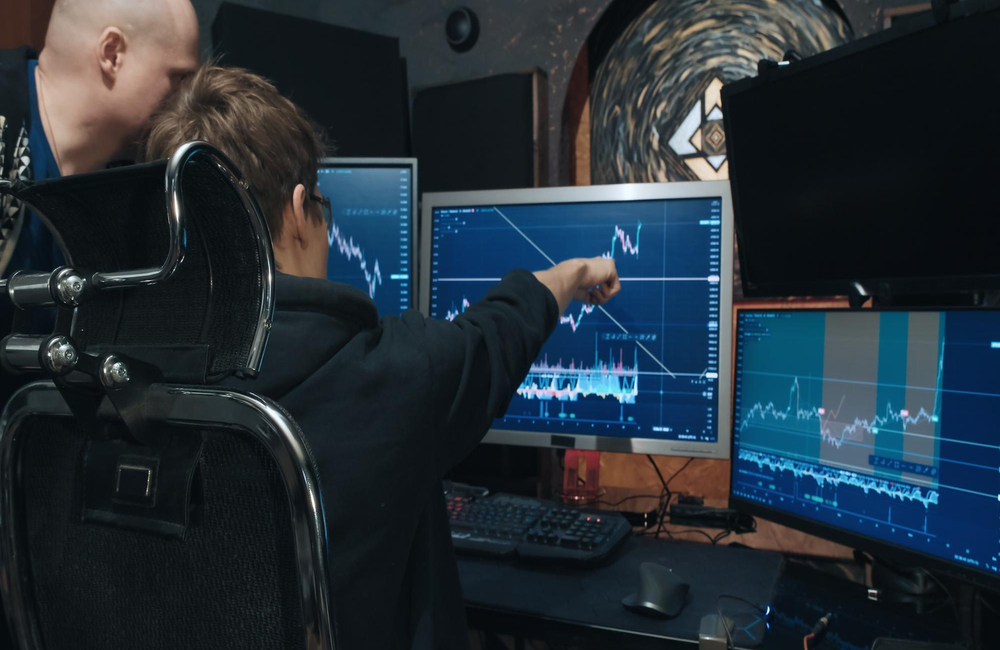ASX futures were off 58 points, or 0.8 per cent, at 7163 at 8.00 am AEST on Friday, pointing to a weak start to trading.
The S&P 500 rose 0.1 percent on Thursday after jumping sharply the previous day. The Dow Jones Industrial Average rose 0.3%. The tech-heavy Nasdaq Composite Index fell 0.6%.
As the death toll rises in Ukraine, V. V. Putin, the Russian president, pledged to fight on “no matter what happens” in a televised address overnight. It came as President Biden moved to expand US sanctions on Russian oligarchs and the consulting giant Accenture joined the corporate exodus with the closure of its 2,300-person Russian practice.
The infusion of volatility in financial markets has come from Moscow’s invasion of Ukraine. The Russian commodities snub will weigh on already high inflation, investors are attempting to sum up, and how aggressively central banks will raise interest rates in the face of even higher prices and an uncertain economic outlook.
“Taking away the geopolitical stuff you see currently, the biggest headwind against the stock market is really interest rates rising in the future,” said Jimmy Lee, chief executive of the Wealth Consulting Group.
Locally, S&P/ASX 200 finished 0.5% stronger at 7154.4, for a five-day win streak for the first time since December.
Commodity stocks led gains again with the benchmark extending momentum from the US where Fed Chair Jerome Powell soothed investor concerns about the pace of interest-rate increases.
The energy and materials sectors were each up more than 2.6 percent as commodity prices held elevated in the wake of the conflict in Ukraine. Energy producers Santos, Woodside and Beach were up 1.7% to 4.7%.
Iron–ore miners BHP, Rio Tinto and Fortescue added between 3.5% and 3.7%, while gold miners largely shed distant gains.
In commodities, gold futures were 1% higher at $US 1940.60; Brent crude fell 2% to $US110.66 having briefly touched US$117 overnight; and Iron ore gained 5.5% at US$153 per tonne.
In bonds markets, US 10-Year Treasury Notes dipped to 1.85%. At home, the Australian 10-year bond yield rose to 2.16%. Yields rise when prices fall.
The Aussie was buying 73.20 US cents at 8.00 am AEST, compared to its previous close at 72.96. The WSJ Dollar Index, which compares the U.S. dollar with 16 other currencies, climbed to 90.54.
Asia
In Asian markets, Chinese shares finished lower, with concerns over an escalating Russia-Ukraine war, and the Fed’s plans to raise interest-rate. The Shanghai Composite Index fell 0.1%, the Shenzhen Composite Index shed 0.8% and the ChiNext Price Index dipped 1.5%. Chinese winemakers were the biggest losers, with Wuliangye Yibin down 3.8 percent, Kweichow Moutai off 2.4 percent and Anhui Yingjia Distillery down 5.7 percent.
Related developments Monitored: coronavirus. Recent reports indicate China is considering ways to ease some of the pandemic-era restrictions, which might raise some hope for more reopening, IG says.
The Hang Seng Index in Hong Kong advanced 0.7%, following gains on Wall Street overnight. Fed Chair Powell staked out the US central bank’s intention to boost rates in a gradual fashion, easing some doubt about the US’s rate-increase cycle, says KGI Research. The HSI's top performers include Techtronic Industries surging 11%, Sands China rising 5.6% and Haidilao International gaining 4.0%. At the same time, Shenzhou International Group tumbles 11%, and Xinyi Glass drops 3.1%. The Hang Seng TECH Index is down 0.2% at 5007.91, wiping out opening gains.
Japanese stocks rose, led by energy and financial shares as the yen weakened despite ongoing uncertainty over the war in Ukraine. Energy firm Idemitsu Kosan surged 6.2%, while trading house Mitsui & Co. gained 4.8%. Dai-ichi Life Holdings surged 4.4% and Mitsubishi UFJ Financial Group advanced 4.1%, as the yield on the 10-year Japanese government bond climbed 3.5 basis points to 0.165%. The Nikkei Stock Average rose 0.7%.
Europe
European stocks fall as the conflict in Ukraine keeps investors on edge. The pan-European Stoxx Europe 600 dropped 2 percent.
“Stock markets are under the cosh once more Thursday as we wait for more negotiations between Ukrainian and Russian delegations,” OANDA analyst Craig Erlam says. “And on Wednesday, we saw a bounce predictably short-lived in the context of reports of deepening offensives by Russian troops.” The sanctions imposed on Russia over the course of the invasion have been much steeper than many had predicted.”
In London, the FTSE 100 fell 2.6 percent, losses widening in afternoon trading. The London Stock Exchange Group has stopped trading in over 50 Russian stocks. Index providers MSCI Inc. and FTSE Russell said they would remove Russian equities from their benchmarks next week, and S&P Dow Jones Indices is considering the same.
Russian stock markets were closed for a fourth straight day as the government tries to limit a fire sale and has imposed capital controls on the ruble itself.
The ruble fell 3.8% Thursday versus the greenback, FactSet data show. That reluctance on the part of investors and brokers to touch the currency has constrained how easy they can make trading it. The currencies of nearby countries have tumbled against the dollar, too, as investors fret about economic spillover. The Polish zloty dropped 0.9% while the Hungarian forint fell 0.6%.
North America
US stocks vacillated between small gains and losses and oil prices declined Thursday while investors digested how a recent surge in commodities prices is liable to influence inflation and the Federal Reserve’s monetary policy.
The S&P 500 edged up 0.1% after climbing sharply Wednesday, and the Dow Jones Industrial Average rose 0.3%. The tech heavy Nasdaq Composite Index fell 0.6%.
Moscow’s invasion of Ukraine has added volatility to financial markets. Investors are attempting to assess how a rejection, particularly of Russian commodities like oil, will filter into already high inflation levels, and how aggressively central banks will increase interest rates in light of new price pressures and a murky economic picture.
“Leaving aside what’s going on geopolitically, the biggest headwind against stock market is really interest rates, and those are going up in the future,” said Jimmy Lee, the chief executive of the Wealth Consulting Group.
U.S. crude prices jumped above $116 a barrel for the first time since 2008, before declining to around $110.
The attention paid to the armistice was the latest sign of an increasingly tense but fragile military situation in the region as representatives from the US, Britain, France, Germany, Russia, China and Iran hold marathon meetings in Vienna around the clock to salvage a 2015 deal that lifted most international sanctions on Iran in return for tight but temporary limits on its nuclear program. The US withdrew from the accord in 2018, and since then Iran has steadily ramped up its nuclear program.
If the deal were revived, Iranian oil exports would help fill the gap left by Russian barrels that global buyers have avoided since the country invaded Ukraine. Investors are increasingly fearful that a sustained increase in oil prices could signal a toxic mix of slowing growth and rising inflation what’s known as stagflation.
European natural-gas prices dropped 11%, reversing this week’s increase. Investors fear that supplies of natural gas could be cut off to Europe because of the war. Roughly a third of Russian gas exports to Europe transit via Ukraine.
Jerome Powell testified Thursday before the Senate Banking Committee as the second day of his testimony continued. Analysts say that his comments about the US economy and possibly elevated inflation after the latest geopolitical developments may be helping support markets.
“It’s going to be pretty rocky here over the next couple of weeks,” said Leo Grohowski, chief investment officer at BNY Mellon Wealth Management. “It’s truly hard to believe that 2021 was a rewarding, low volatility year and this year we’ve had just the opposite.”
Shares of energy companies that should benefit from higher oil prices wavered in tandem with prices. ConocoPhillips fell 0.4% and Occidental Petroleum rose 0.3%, respectively.
Shares of Snowflake fell 17% after the company provided guidance on sales that was weaker than expected, on track for its biggest percentage drop ever. Best Buy rose 9.6 percent, set to have its biggest one-day percentage gain since May 2020. Shares of Okta (OKTA) lost 8.2% after the software company issued guidance implying that aggressive investment would bring the prospect of greater-than-expected near-term losses to the bottom line. Kroger rose 12% after it said its sales and profit increased.
US bond markets saw the yield on the benchmark 10-year Treasury note edge to 1.859% from 1.862% Wednesday. Yields rise and prices fall, or vice versa.
“We see rates as volatile because you have two big forces pulling in opposite directions right now,” said David Grecsek, managing director at the wealth management firm Aspiriant. While investors flock to bonds in times of turmoil, negative real rates may discourage interest, Mr. Grecsek said.

























